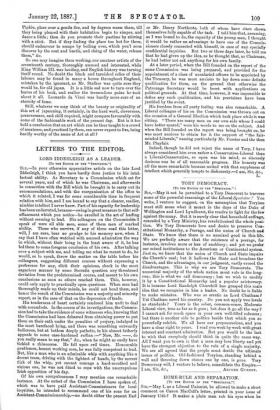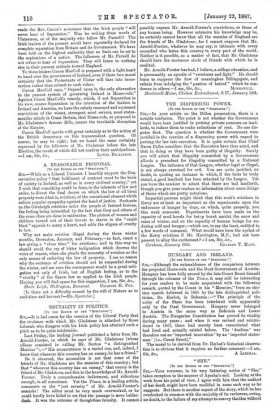HOME-RULE AND SEPARATION.
[TO THE EDITOR OF THE "SPECTATOR."]
Sra,—May I, as a Liberal Unionist, be allowed to make a short comment on Canon MacColl's letter, printed in your issue of January 15th? It makes a plain man rub his eyes when he reads the Rev. Canon's assurance that the Irish people "will never hear of Separation." Was he writing these words of Ulstermen, or of the majority who follow Mr. Parnell? The Irish leaders of the present revolt have repeatedly declared for complete separation from Britain and its Government. We have been told on the highest authority that no limit can be set to the aspirations of a nation. The followers of Mr. Parnell do not refuse to hear of Separation. They will listen to nothing else in their present attitude toward England.
To these leaders Canon MacColl is prepared with a light heart to hand over the government of Ireland, even if there be a moral certainty that the Protestants of Ulster will flare into insur- rection rather than submit to such rulers.
Canon MacColl says, "Depend upon it, the only alternative to the present system of governing Ireland is Home-rule."
Against Canon MacColl's remedy, which, if not Separation in his view, means Separation in the intention of the leaders in Ireland and America, we have the calmly reasoned and expressed convictions of the wisest, strongest, most serious, most states- manlike minds in Great Britain, that Home-rule, as proposed in Mr. Gladstone's famous Bills, means the inevitable disruption of the Empire.
Canon MacColl speaks with great certainty as to the action of the British democracy on this transcendent question. Of course, he may be right ; but we heard the same certainty expressed by the followers of Mr. Gladstone before the late Election, the result of which did not confirm their anticipations.



































 Previous page
Previous page